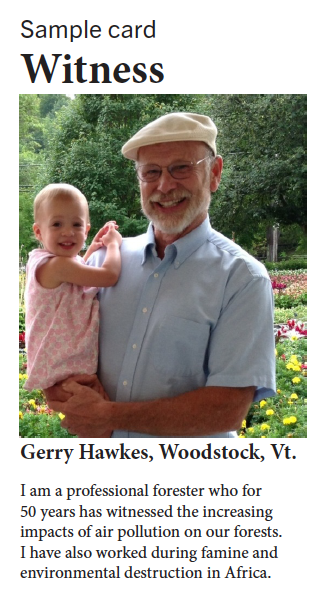The descriptions below, along with photographs of MCCN members, provided a visual picture of our network at the Mennonite Church USA convention, July 2019. The purpose was not to call out exemplary people so much as to provide language for our differing temperaments and the ways we can work together for the common good. We invited passersby to add themselves to the display, using the list of types below or defining their gifts in their own way. How would you describe yourself?

Simple Living Stewards are known for practices such as thrift, recycling and fair-trade shopping. They express their concern for the earth at home and at church, in the spheres where they can make a difference. They avoid material clutter. Others admire their integrity and borrow their recipes for homemade cleaning supplies.
For Foodies, eating is a moral issue. They recognize that how we grow our food has affects both farm workers and other species, and they eat accordingly. Some are vegetarian; others seek out sustainably raised food.
The Gardeners believe all the world’s ills can be solved with a backyard garden. Some provide fresh produce to a food pantry or gardening know-how to their communities. Others garden just for the joy of it and find the work deeply spiritual.
Building Geeks love energy efficiency. They save the church money and carbon. They may do it with a caulk gun, a schedule for changing the furnace filters, a kill-o-watt meter or a ground source heat pump.
The Naturalists have a deep and abiding love of nature. Beauty, solitude or wildness draws them outdoors. This is where they are most likely to experience the presence of God. They camp, hike, watch birds or walk on beaches—and sometimes skip church to do it.
Witnesses have direct, painful experience with environmental problems. A witness might live in a food desert or suffer from asthma due to air pollution. For others it might be a childhood farm that was bulldozed or a trip to an area harmed by deforestation. The firsthand testimony of witnesses is a powerful gift that motivates others.
Watershed Disciples are rooted in the regions where they live. They are bridge builders and joiners who know local channels for getting things done. Watershed disciples might spearhead bike-friendly initiatives or take people on tours of the local landfill. They extend God’s love beyond the walls of their church to the surrounding community and ecosystems.
Triple Bottom Line Champions are not content just to make money. They are always looking for creative ways to succeed in the workplace while improving the lives of people and the health of the planet. Whether they are in finance or diesel mechanics, clothing retail or something else, they combine practical instincts with green innovation.
Faith Anchors connect environmental issues with the Christian tradition. They may study theology or ask basic questions like, “What does this have to do with Jesus Christ?” Faith anchors lead Bible studies, write church vision statements and plan creation worship services. They remind their churches why we should care about creation.
Activists believe in the power of grassroots movements to disrupt power structures. They are knowledgeable about current environmental problems and take action. They may call government officials or attend marches; they may pray with those seeking justice or find other creative responses. Activists embody and explain issues that many find abstract. Because they care about what’s going wrong, their churches might too.
Eco-Donors give time, talent or money to creation care. They might fund a pollinator garden or provide the volunteer labor needed to tend it. Their gift could be a visionary new idea, a healthy dose of realism or the engineering skills that enable a church to install solar panels.
Professionals have made care of the earth their life’s work. They may be land managers, farmers, environmental educators, professors, policy makers or something else. Their skills are essential for many projects.